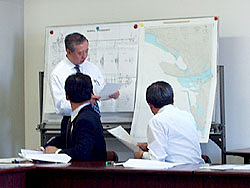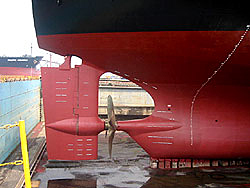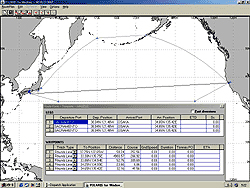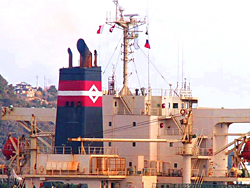Environmental Measures
Daiichi Chuo Kisen Kaisha has always sought to be a green corporation, taking the initiative in protecting the environment with activities that are always a step ahead of regulations, such as adopting state-of-the-art waste oil processing equipment for its fleet and using environmentally friendly antifouling paint for the hulls. To strengthen our environmental initiatives even further, we obtained the ISO14001 Certification for Environmental Management in November 2005. We have also amalgamated our knowhow, committing it to writing in the Daiichi Chuo Kisen Environmental Charter, and we are taking an even more progressive approach to environmental protection by integrating ship and shore.
Environmental Policy
Basic Philosophy
We understand the importance of the relation between ships and our environment on a global scale, including the ocean, the atmosphere, flora and fauna, during normal operation and in the event of a marine casualty.
Therefore, we declare a commitment that all of the personnel of Daiichi Chuo Kisen Kaisha shall endeavor to protect the environment through the united efforts of the entire Company with the objective of passing on a beautiful environment to the next generation.
Basic Policy
- To promote environmental protection activities on a global scale, we shall strive to prevent environmental pollution and to practice safe navigation by integrating ship and shore, aiming for Three Zeros (zero physical injury, zero marine casualty, zero oil pollution accident).
- We shall act in accordance with the Environmental Management System (EMS) of the Company, comply with domestic and foreign legal requirements related to the environment, and endeavor to improve environmental management.
- Taking into account the possibility that the Company's activities may have a major impact on the environment, we shall establish objectives and targets for environmental protection, reviewing them at planned intervals and continuously expand activities to protect the environment.
- We shall promote energy and resource conservation, and strive to recycle and reduce the quantity of waste matter generated as a result of ship operations and shore duties.
- We shall give special consideration to the environment when procuring equipment or materials for new building or maintenance repairs of ships.
- As well as striving to improve awareness of environmental protection among employees through environmental education, we take active part in activities to protect the environment.
- We have committed the Environmental Charter to writing to get the message across to employees and all persons working for us, and to publicize it to the general public.
Preventing Marine Pollution


- Ship Waste Management
Waste generated on board is properly managed by crew assigned responsibility for waste management under the Environmental Management System Procedure and in accordance with the International Convention for the Prevention of Pollution from Ships (MARPOL 73/78). - Exchanging Ballast Water (sea water used as weight to keep the ship stable when not carrying cargo)
To secure the stability of a ship not carrying cargo, ballast water is taken aboard the ship when the cargo is unloaded. When the ship is loaded with cargo, the ballast water is discharged. In recent years, the aquatic microbes (aquatic organisms) carried in the ballast water have been acknowledged as problematic since they have a significant impact on ecosystem balance in ocean areas everywhere. The Daiichi Chuo Kisen Group practices ballast water exchange in accordance with the Guidelines of the International Maritime Organization (IMO). We have established provisions for managing ballast water in the Environmental Management System Procedure and we have created a proprietary Ballast Management Plan. - Preventing Marine Pollution Caused by Oil Spills
In the event of a serious accident, such as a collision or grounding, there are concerns that marine pollution caused by the discharge of fuel oil or other loadedo oil will have an adverse impact on the marine environment. As well as initiatives for safe navigation, the Daiichi Chuo Kisen Group implements drills and on-board training in line with the Environmental Management System Procedure, which complies with the International Convention for the Prevention of Pollution from Ships (MARPOL 73/78) and the national Law Relating to the Prevention of Marine Pollution and Maritime Disaster.
In addition, waste oil and bilge water (the oily mixture accumulating below the engine room as a result of leaks from machinery) generated on board are properly processed under the supervision of crew assigned responsibility for preventing oil pollution. - Regulations for Anti-Fouling Paints
Since there are concerns that ships lose speed and fuel consumption increases when seaweed and barnacles attach themselves to a ship's hull, anti-fouling paints containing organotin have been widely used. However, it has been pointed out that organotin dissolves in the sea, accumulating in marine organisms, and in turn, exerting a harmful influence on human health in the form of environmental hormones. Concerning the control of organotin anti-fouling paint, the International Maritime Organization (IMO) has voted to adopt regulations to the effect that application to hulls will be banned as of January 1, 2003 and a ban on its presence will take effect on January 1, 2008.
The Daiichi Chuo Kisen Group has used environmentally friendly organotin-free paint for ships built in Japan since 1990. We have completed to repaint all exsting ships with non-organotin paint as we gradually move toward complete abolition. - Stern Tube Sealing System
Stern tube sealing system prevents seawater ingress around the propeller shaft and lubricating oil leakage into the sea. We have reinforced to prevent oil leakage and sea water ingress by adapting air seal type stern tube sealing system or equiping spare sealing.
Prevention of Air Pollution


- CO2
CO2 is considered one of the principal causes of global warming. Reducing fuel oil consumption is effective in order to control CO2 emissions from ships. We are striving to suppress CO2 emissions through navigational efficiency by optimizing route selection, installation of a recycling system for exhaust gas energy, ships’ bottom cleaning and the propeller polishing during periodic dry-dockings, and appropriate combustion control of engines. - NOX / SOX
We have established emission controls at our shore facilities for NOX / SOX, which are believed to cause acid rain. As for ships, MARPOL73/78* Annex VI (Regulations for the Prevention of Air Pollution from Ships) has adopted benchmark stipulations regarding NOS/SOX emissions, which came into effect on May 19, 2005. We have already been installing engines that comply with these regulations for all new builds since January 1, 2000. - Chlorofluorocarbons
Chlorofluorocarbons are classified as CFC, HCFC and HFC. CFC and HCFC have been identified as ozone-depleting substances and restrictions on the use of these harmful refrigerants were adopted under the 1985 Vienna Convention and the 1987 Montreal Protocol. As a result, production of R-12 (CFC) ended in 1995 while restrictions on R-22 (HCFC) have been intensified. These refrigerants have been used in refrigeration and air conditioning installations on ships and on shore but we have gradually been introducing new refrigerants to replace CFC and HCFC. - Preventing the Generation of Dioxin
Dioxin will be mainly generated by incineration of garbages or waste materials. To prevent generation of dioxin, We have adapted the incinerators capable of rapidly cooling down the exhaust gas to all new builds.

